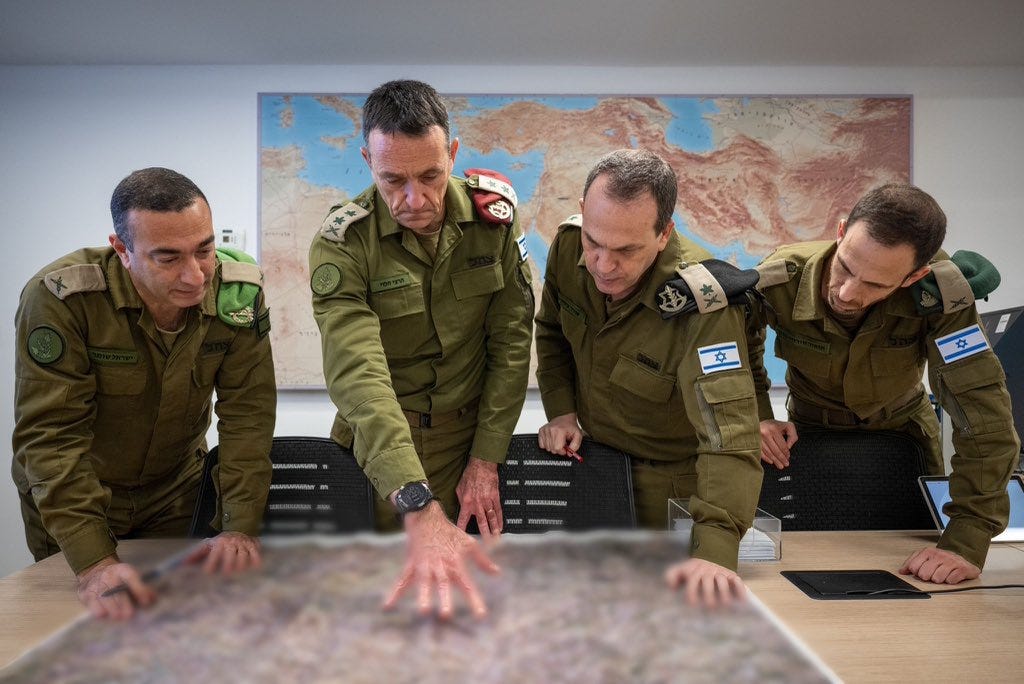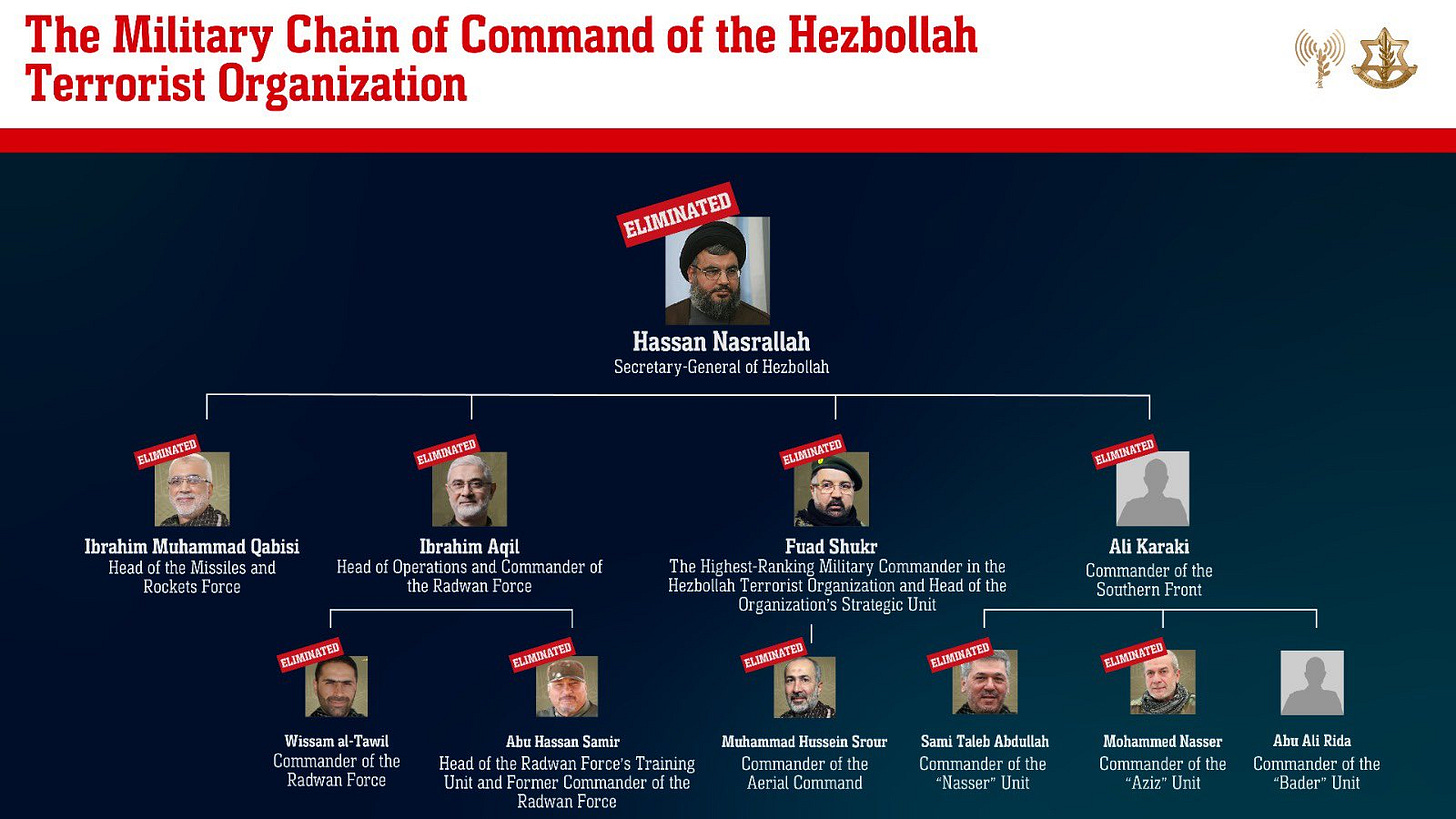Don't blame Israel for honoring Hezbollah's death wish.
Jihadists are infatuated with martyrdom. Israel is just giving them a fast-pass to their deepest desires.

Please consider supporting our mission to help everyone better understand and become smarter about the Jewish world. A gift of any amount helps keep our platform free of advertising and accessible to all.
This is a guest essay written by Andrew Fox, a former British Army officer and current think tank research fellow focusing on defense, the Middle East, and disinformation.
You can also listen to the podcast version of this essay on Apple Podcasts, YouTube Music, YouTube, and Spotify.
For eleven months — following October 8th, 2023, when Hezbollah joined Hamas’ war on Israel — the Jewish state has been under sustained fire from the Jihadist terror group.
As the war in Gaza to dismantle Hamas has ground on, more than 60,000 Israelis have been displaced from communities in northern Israel, forced to live in hotels and with family elsewhere.
An attempt to attack Tel Aviv in July saw a huge aerial bombardment from the IDF, prompting these displaced northern communities to ask why an Israeli response to their displacement was taking so long.
Now we know.
Aside from the fact that a hit on military or intelligence installations in Tel Aviv would have been strategically disastrous, requiring a preemptive response, Israel was necessarily biding its time before escalation.
As I reported from meetings in Jerusalem and Tel Aviv earlier this month, there has not been unity on strategy at the top of Israel’s government. Israeli Prime Minister Benjamin Netanyahu directed that Hamas be dealt with first; Defense Minister Yoav Gallant wished to respond to Hezbollah before conducting operations in Gaza. Netanyahu wished to finish operations in Gaza before turning north; Gallant wanted a ceasefire-for-hostages deal in Gaza and to take the fight to Hezbollah instead.
The last two weeks show us that Israel opted for a compromise between these two positions. Operations in Gaza continue with four manoeuvre brigades holding the Netzarim and Philadelphi corridors, the movement controls along Gaza’s waistband and southern border. Netanyahu has his wish for no ceasefire and to retain control of the border with Egypt. Gallant has his wish for operations in Lebanon to restore security to Israel’s northern border.
Everyone is a winner — expect Hezbollah and Hamas.
There are clear parallels between Hamas and Hezbollah but with one critical difference. They both have comprehensive tunnel networks. They both hide weaponry amongst the civilian population. Hezbollah has tried the same propaganda operations in the West that Hamas manipulated so successfully.
However, without the fertile soil of 70 years of a Palestinian pity-party, and despite the best efforts of Western mainstream media like The New York Times and BBC, only a few hardcore niche Left-wing lunatics have taken up Hezbollah’s cause on Western streets.
The main difference, though: Hezbollah did not have the strategic advantage conferred by Israeli hostages. The situation in Lebanon looks how Gaza would have proceeded had Hamas not tied the IDF’s hands by abducting Israelis to leverage a ceasefire.
Israel has spent the last eleven months, and possibly years since the last Israel-Hezbollah war in 2006, saturating Lebanon with intelligence assets. The pager and walkie-talkie operation was a startling hit on Hezbollah’s fighting capability and will go down as one of the greatest intelligence operations of all-time. It removed some 3,000 fighters from the battlefield and has been followed by a relentless series of air strikes.
Back in June, I wrote that Israel’s targeting focus must be on rocket launchers and Hezbollah command and control. This has been borne out by the events of the last two weeks. The whole Hezbollah senior chain of command is now dead, and their rocket stores are reportedly reduced by 50 percent.
So how does this play out from a strategic perspective?
The Israeli aim is to eradicate Hezbollah and restore deterrence against Iran’s proxies. Lebanon’s future will hinge on the surrender of what remains of Hezbollah, so that displaced Israelis can move home. This will involve a ground operation to clear southern Lebanon, but only if Israel has to.
Hezbollah’s surrender remains still the better option by far for both sides and for the people of Lebanon. The terrain and tunnels in southern Lebanon have not changed, but Hezbollah’s command and control, and their strategic ability to counter-punch, is now degraded significantly. Any ground operation now faces an easier ride.
Northern Israeli communities remain unsafe while within range of what remains of Hezbollah’s weapons, but a ground invasion now looks far less likely. It hinges on whether Hezbollah is deterred by the certain death and injury of thousands of their fighters. Are they willing to die for Iran? The IDF has shown the ability to degrade them incessantly from the sky. This is a powerful motivation not to fight on.
The “air power only” approach was a disaster for NATO in Libya because it created a vacuum to be filled by malign actors, including the Islamic State (ISIS). However, there should be no vacuum in Lebanon after Hezbollah is eradicated. There is a Lebanese government already in place — hopefully soon to be more free of the toxic cancer that has been consuming their country like a parasite for decades.
A ground war may not now be needed, but will happen if Hezbollah does not get the message. While two weeks ago this would have been a significant military challenge due to the threat of retaliatory rockets on Tel Aviv and Hezbollah’s well dug-in positions, it now looks like a far safer proposition for an IDF tired and logistically strained by enduring operations in Gaza.
Iran is behind all the unrest that we currently see in the Middle East. Tehran is watching their favorite proxy being dismantled and they are powerless to respond.
Will we see a rush for nuclear weapons from Iran in response to the degradation of their proxy strategy, and will Israel respond? It appears that nothing Iran does will raise the West from their torpor and their mantra of “deescalation and ceasefire.” Once again, Israel may have to do the heavy lifting alone. They have proven that they can.
Where does this leave Israel when the dust settles from this past week’s airstrikes, the most remarkable of which assassinated longtime Hezbollah chief Hassan Nasrallah?
Iran retains proxies in Syria, Iraq, and Yemen. There are unresolved issues in Gaza, most notably, the hostages. Iran will also continue to foment insurgency in the Palestinian West Bank and continue to try running arms across the Jordan Valley.
The question of “Palestine” remains unsolved, and certainly no two-state solution looks remotely possible in the near future while Palestinian Arabs continue their opposition to Israel’s existence. A solution to this festering sore remains elusive, but is likely not military in nature.
The international position of Israel remains challenging, with Israel isolated on the world stage. That is not an easy fix. More importantly, the U.S. remains its key ally. This war may have been a wake-up call for Israel to wean themselves off their dependence on American military aid, but they have an economy to rebuild and diplomatic relations to restore in their near abroad, particularly with Saudi Arabia and other Gulf partners. They know full well that the American veto in the United Nations Security Council remains their greatest weapon in the viscerally anti-Israel UN. It is not a diplomatic link they can afford to sever.
With the death of Nasrallah, the Middle East is a marginally better place today — seeing celebrations on the region’s streets in stark contrast to the mournful scolding of Western leaders and international media. With the substantive eradication of Hezbollah, Lebanon is certainly in receipt of a gift from the people of Israel.
Still, Israel has a long way to go, not least in Gaza, before future peace is guaranteed. While military effort is sometimes a necessity, the long-term solution to issues in the region remains diplomatic and economic.
Once again we see the mortal and suicidal weakness in the West’s obsession with deescalation and diplomacy. Sometimes force is necessary and needed to bring about peace through superior firepower.
Remember former U.S. President Ronald Reagan’s words:
“We know that peace is the condition under which mankind was meant to flourish. Yet peace does not exist of its own will. It depends on us, on our courage to build it and guard it and pass it on to future generations. George Washington’s words may seem hard and cold today, but history has proven him right again and again. ‘To be prepared for war,’ he said, ‘is one of the most effective means of preserving peace.’”





Well Mr Nasrallah will finally get his wish to slobber over 72 virgins at the end of the rainbow. And yet nobody asks what did these poor girls did to deserve such a disgusting fate.
And yet no Muslim from that part of the world acknowledges the massacres in Israel or Iran or Iraq or wherever!